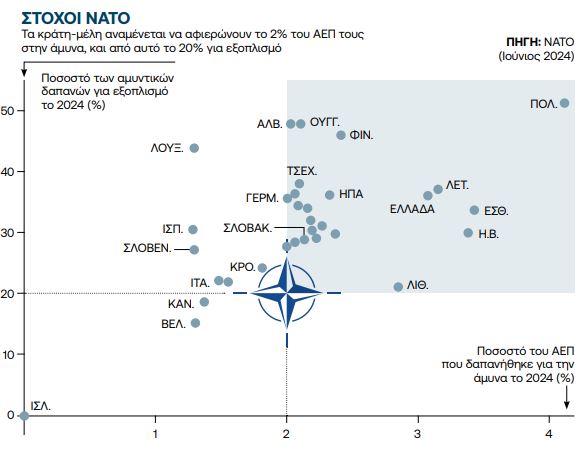Barring the unexpected, “the most extreme scenario of the US withdrawing from NATO will not come true,” says Vima Ian Lesserhead of the German Marshall Fund office in Brussels, analyzing the balances that have been formed since his election Donald Trump.
What exactly does Donald Trump’s return to the White House mean for NATO?
“I believe that the most extreme scenario of the US withdrawing from NATO will not happen, although, based on his previous tenure, President Trump is unpredictable. Capitol Hill continues to politically support NATO. Staying in the Alliance is in the best interest of the US. Moreover, it is unclear whether it is politically and legally possible for Trump to withdraw from NATO, if indeed he plans to do so. Of course, even if the country does not withdraw from the Alliance, I am sure that the re-elected president can make things very difficult and stressful for it. NATO works by consensus and if its largest and most powerful member is skeptical, that will make it difficult to function.”
In this case, are there safeguards so that the cohesion of the Alliance is not shaken?
“I believe that the only safety net is the objective strategic conditions facing the allies today, such as the war in Ukraine, among other existing challenges. The issue of NATO’s credibility is critical. But there are no official guarantees within the Alliance to maintain consensus. Everything, from the smallest to the largest, including Article 5 commitments (note: binds partners to defend a member state under attack), is a matter of political will.
So it’s really critical that the US participates in NATO in a meaningful way, without shocks. On the other hand, I think the Alliance is prepared for burden sharing. A debate that has been intensifying over the years is that European allies should undertake and pay more of their own free will, beyond pressure from Washington, for a number of reasons. European autonomy is a matter of strategic necessity, in the sense that a crisis in Asia and China could pull the US out of Europe, regardless of the outcome of the November 5th election. Then the crucial question for Europe will be whether such a transition will take place sooner or later.
My feeling is that the core of the interests of the Trump administration will be international economic policies, namely an economic nationalism, centered on the American economy. This will be his driving force. One of the challenges of the new American administration will be to reconcile the economic frictions that will arise with the European allies, while there is a call for greater cohesion in the Alliance. How can you achieve closer defense relations when you are engaged in a trade war with your allies?
There is, however, clearly a drive to build up Europe’s defense capability. This process, which will take years to develop substantially, could be carried out either within the EU or within NATO through the strengthening of its European pillar or a combination of the two”.
Is Europe ready for Trump’s new presidency?
“Europe was prepared for this eventuality. Probably, his election is not the desired development for most Europeans, but as a matter of fact it is not surprising. Nevertheless, Europeans are far from prepared for the implications of his new term in the White House, both in relation to tariff and trade policies and in terms of the possibilities related to their security. The people who will be appointed to the Trump administration will influence the policies that we will see advance in the US.”
How will the war in Ukraine be affected? Ukrainian President Zelensky does not hide his concern.
“President Zelensky, like all European leaders, will have to adapt to the new political reality that will take shape in Washington. I do not think that anything will change in relation to the support of Ukraine. All that Trump’s election apparently changes is the acceleration of the already existing debate about the need for further clarification of war aims and the prospect of a cease-fire.
This, I am sure, will be a priority for both the Trump administration and the other side of the Atlantic. It also remains to be seen how Moscow will assess the ongoing developments and its own operational prospects. Will she be willing to sit down at the negotiating table for a ceasefire? Maybe there will be conditions for negotiations that we have not seen before. I think on all sides there has been a waiting game for the outcome of the November 5 election. Now that we know about it, the aforementioned procedures will probably be initiated.”
Will Donald Trump’s relationship with Turkish President Recep Tayyip Erdogan be as close as it was during his first term? What should we expect in the security issues of the Eastern Mediterranean?
“Honestly, I don’t think their relationship was really that close. There was a degree of sympathy, but it was undercut by concern about the S-400. Hence I don’t think that Trump’s policies on Ankara will be different from President Biden’s policies. While Turkey’s strategic importance is acknowledged, at the same time there are major differences, such as over the S-400s and the war in Gaza. In summary, I believe that the US-Turkey relationship will remain important, but at the same time problematic. Furthermore, I do not foresee major changes in the needs of American policy in the Mediterranean, nor do I see anything particularly negative in relation to Greece. Greece is a partner of the EU and NATO. Bilateral relations under the Trump presidency will likely be predictable. Relationships involving more parties, less.”

#Ian #Lesser #BHIMA #critical #joins #NATO

